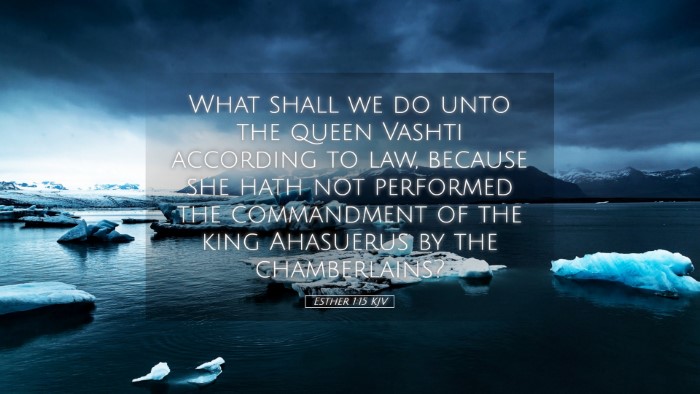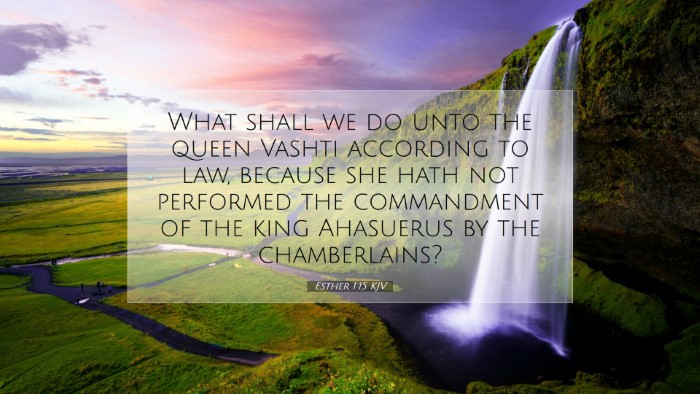Old Testament
Genesis Exodus Leviticus Numbers Deuteronomy Joshua Judges Ruth 1 Samuel 2 Samuel 1 Kings 2 Kings 1 Chronicles 2 Chronicles Ezra Nehemiah Esther Job Psalms Proverbs Ecclesiastes Song of Solomon Isaiah Jeremiah Lamentations Ezekiel Daniel Hosea Joel Amos Obadiah Jonah Micah Nahum Habakkuk Zephaniah Haggai Zechariah MalachiEsther 1:15
Esther 1:15 KJV
What shall we do unto the queen Vashti according to law, because she hath not performed the commandment of the king Ahasuerus by the chamberlains?
Esther 1:15 Bible Commentary
Commentary on Esther 1:15
Esther 1:15: "What shall we do unto the queen Vashti according to law, because she hath not performed the commandment of the king Ahasuerus by the chamberlains?"
This verse encapsulates the pivotal moment in the Book of Esther where the authority of the king is called into question by the disobedience of Queen Vashti. An analysis of this text reveals rich theological and ethical implications that resonate through history and bear reflection for contemporary audiences.
Contextual Analysis
The setting of this verse is a royal banquet hosted by King Ahasuerus, intended to demonstrate his power and wealth. Vashti's refusal to display herself before the king and his guests becomes the crux of the narrative, leading to her eventual dethronement.
- Authority and Governance: The verse raises questions regarding authority structures and the consequences of defiance. The king's concern for the law demonstrates an understanding of governance, suggesting that royal decrees, once made, must be adhered to maintain order within the empire.
- Gender Dynamics: Vashti's stance challenges the gender expectations of her time, showcasing her strength and independence. Her rebellion against the king is not merely personal but emblematic of broader themes of female empowerment and resistance.
Insights from Commentators
Matthew Henry
Henry notes that Vashti's refusal to obey King Ahasuerus's command was not just an act of disobedience but represented a deeper moral stand. He argues that her decision highlights the potential conflict between divine obedience and earthly authority. Henry emphasizes that believers must often navigate these conflicts in their own lives.
Albert Barnes
Barnes focuses on the implications of law and the role of the king. He suggests that the edict to bring Vashti forth was not merely for the king's pleasure but aimed at reinforcing his authority over the nobles and the subjects present. Barnes points out that the king’s dilemma reflects the nature of leadership, which often grapples with personal desires versus public expectations.
Adam Clarke
Clarke elaborates on the cultural context of the Persian empire, suggesting that Vashti's act of defiance was unprecedented. He posits that her choice illuminated not only her character but also the precarious position of women in a patriarchal society. Clarke contends that this moment paved the way for Esther's rise to prominence, showcasing God’s providence in the unfolding narrative.
Theological Implications
This verse offers profound theological insights as it connects to broader themes of power, faithfulness, and divine providence. It raises essential questions for reflection:
- Submission vs. Integrity: The tension between submitting to authority and maintaining personal integrity is echoed in various theological contexts. Believers are challenged to discern when to comply and when to resist, seeking guidance from Scripture and prayer.
- Divine Sovereignty: God's providential hand is subtly at work in this narrative, guiding events towards a greater purpose. The dethronement of Vashti is part of the divine orchestration leading to Esther's rise, illustrating that God's plans often unfold through human actions and decisions.
Practical Applications
For pastors, theologians, and students, Esther 1:15 serves as a critical reminder to reflect on authority dynamics within their congregations, educational institutions, and broader communities. The following applications can be derived from this verse:
- Empowerment of Voice: Encourage individuals, especially women, to find their voices within the church. Vashti's story can inspire discussions on the roles and scriptures that affirm women’s contributions to ministry and community leadership.
- Crisis Leadership: Examine how leaders respond to crises and dissent. Ahasuerus's need for counsel from his advisors can provoke reflection on the importance of collaboration, humility, and wise guidance in leadership.
- Cultural Sensitivity: The cultural dynamics illustrated in this text remind church leaders to be sensitive to their communities' diverse backgrounds and practices, fostering environments that honor integrity while navigating the complexities of authority.
Conclusion
Esther 1:15 stands as a profound inquiry into the nature of power, obedience, and the human spirit. As we engage with this text, we are reminded of the complexities of our moral decisions and the significant role of women in the unfolding narrative of salvation history. This commentary encourages readers to delve deeper into the text and to consider the interplay of divine purpose and human agency in their own lives.


